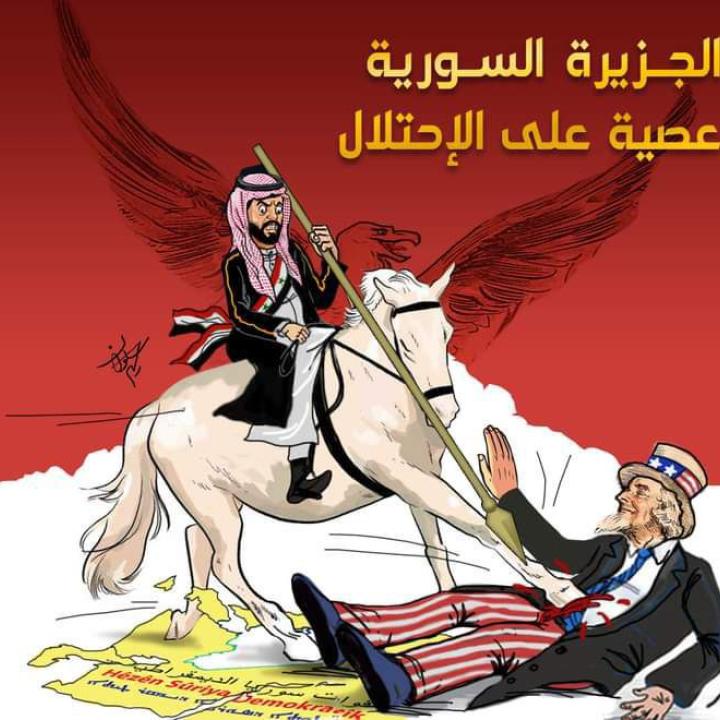
Anti-U.S. Attacks Linked to the Sons of Jazira and Euphrates Movement

The "Jazira" brand has begun claiming, through very transparent communiques, that it is undertaking rocket attacks on U.S. bases in Syria.
As part of the Iran-led "axis of resistance" kinetic campaigns against U.S. assets in Syria and Iraq, an online brand purporting to represent a Syrian tribal militia has been used to claim rocket attacks on U.S. bases in eastern Syria.
On October 26, 2023, the Iraqi muqawama social media reported a rocket attack on U.S. troops at the Conoco base in the countryside of the northern Deir al-Zour region (Figure 1). Unlike all but one of the attacks on U.S. assets in Iraq and Syria since October 17, 2023, this attack was not claimed by the Islamic Resistance in Iraq. Instead, some Iraqi muqawama Telegram channels suggested that a Syrian militia called Harakat Abna al-Jazira wal Furat (Sons of Jazira and Euphrates Movement - see our profile here) has taken responsibility for the attack (see figure 2).
The Sons of Jazira and Euphrates Movement is a militia formed from a few tribal forces in eastern Syria. It is linked to the Syrian regime and works with Iran-backed militias in eastern Syria. Their arch foe is the U.S.-supported Syrian Democratic Forces (SDF), making it logical that the movement also views U.S. bases and personnel as legitimate targets.
The Sons of Jazira and Euphrates Movement did not itself issue any statement claiming responsibility for October 26 rocket attack against the Conoco base, but nor did it deny third-party online attribution of the attack. Instead, a few hours before the purported October 26 attack, the movement posted a message on its social media accounts talking about an escalatory move. The post reads:
“Very important! Special sources confirmed to the 'Sons of Jazira and Euphrates Movement' that the commander of the tribal forces, Sheikh Ibrahim al-Hafel, met with the sheikhs and notables of the Jazira tribes. The meeting discussed preparing the fighting groups and military commanders and determining the time for the attack in coordination with the field commanders. The sheikhs and notables present unanimously agreed to give confidence to Sheikh Ibrahim al-Hafel [to lead the military efforts]. The sources refrained from mentioning more details about this meeting” (see figure 3).
The message did not specify the target of the attacks discussed in the meeting, but a few hours later the Sons of Jazira and Euphrates Movement social media account posted a message hinting strongly at their responsibility in the rocket attack against Conoco base. The short message reads “Stoning the devil. Conoco [gas] field. To support the Flood [of al-Aqsa Operation].” The message included an emoji of a rocket, indicating that the post is discussing a rocket attack (figure 4).
The next day, October 27, Iraqi muqawama social media reported a similar attack, this time against the U.S. troops based near al-Omar oil field, also located in Deir al-Zour (figure 5). Similarly to the October 26 Conoco attack, this purported al-Omar oil field attack was not claimed by Islamic Resistance in Iraq, and similarly, Sons of Jazira and Euphrates Movement again strongly hinted at their responsibility in a social media post. The post reads, “A fiery morning which heals the chests (makes you happy). Omar [oil] field. Bless the hands [who were behind the attack].” This message also included an emoji of a rocket (figure 6).
Thus far, the attack stream launched in Iraq and Syria since October 17, 2023, was solely claimed by the Islamic Resistance in Iraq, less the first attack (initially claimed by Tashkil al-Waritheen before it removed the claim and Islamic Resistance in Iraq became the sole claimant) and an October 19 attack on Baghdad airport (still unclaimed). The first the Sons of Jazira and Euphrates Movement-claimed attacks came before U.S. airstrikes overnight on October 26-27, and the second came after those strikes. Underlining the manner in which the Islamic Resistance in Iraq is still active, the umbrella group claimed a drone attack on al-Asad in Iraq on October 27.
The association of attacks in Deir al-Zour with a local tribal force is probably an effort to send the message that Iran’s Syrian allies are now part of the campaign against U.S. bases. This was probably the case even before the Sons of Jazira and Euphrates Movement began claiming attacks in its own name, with local Sunni tribes providing some operators to assist in local attacks in Deir al-Zour, but now those partners are being publicly built up by the muqawama propaganda machine. This may be a warning to the United States that tribal proxies may be further mobilized to destabilize U.S./SDF operating areas.









